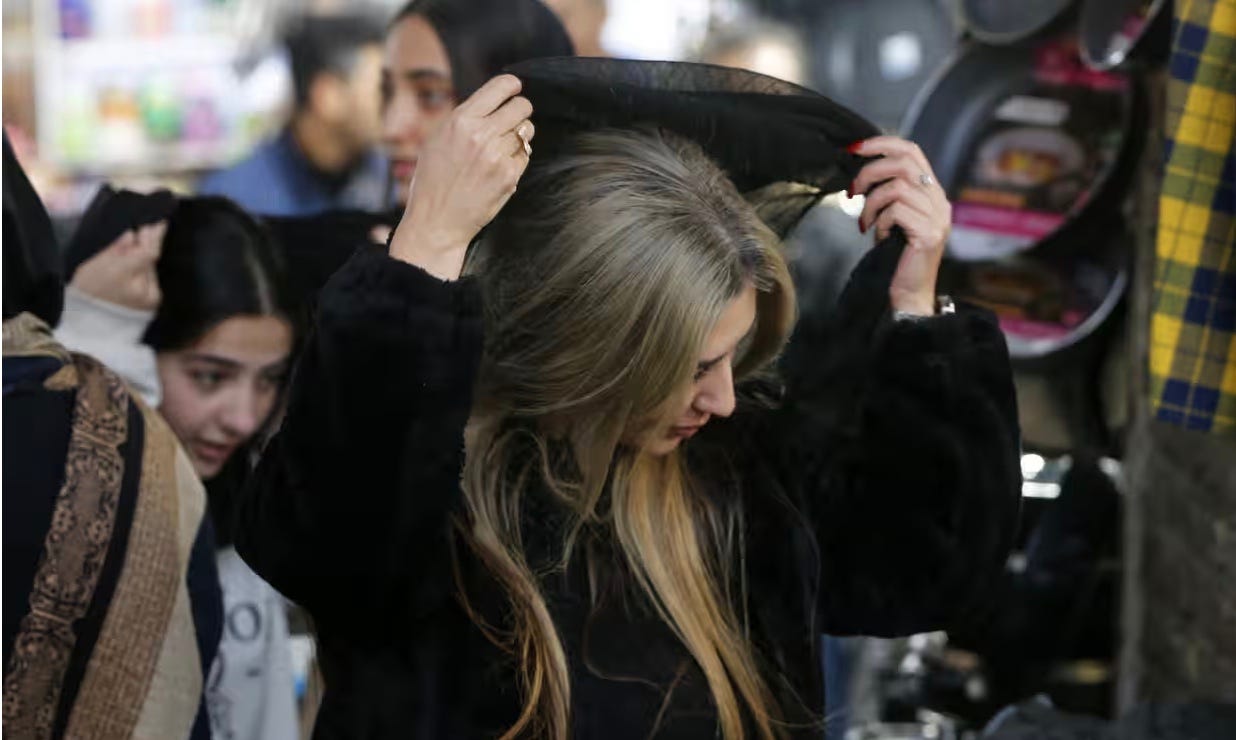I wrote about the delays opening Auschwitz because the SS couldn’t obtain the required permits for the waste water treatment and sewage plans, which were deemed insufficient by Reich engineers:
Auschwitz: what is its meaning?
Why did I tell the story?
I wanted you to think about the concept of law.
Everything that the Nazis did was legal under Reich Law. They were assiduous about making sure that everything they did had a legal basis, including the Nuremberg Race Laws, which were more lenient in some regard then the anti-miscegenation laws of the Jim Crow south.
Today is a momentous anniversary in world history. Seventy-six years ago, from the ashes of war and the Holocaust, a declaration was made about humanity and human rights, architected by one of the greatest Americans of the 20th century — Eleanor Roosevelt. Officially, it was called the United Nations Universal Declaration of Human Rights.
Forty-seven years later another American woman delivered her most famous declaration.
Hillary Clinton said this about women in a speech delivered at the Fourth World Conference on Women in Beijing, China, on September 5, 1995:
Let it be that human rights are women’s rights and women’s rights are human rights, once and for all.
During the last days, one of the most evil regimes in the world has collapsed, along with the ambitions of the Ayatollahs in Iran.
They are teetering, and what happens near the end for tyrants is that they tighten the yoke.
Across the Middle East, Iran’s terror armies of Hamas and Hezbollah have been shattered. Vladimir Putin has lost over one million Russian soldiers in Ukraine. The effort is sustained by soldiers from the slave nation of North Korea, where millions are starved and imprisoned.
The world is about to experience convulsive change, and from it, there will emerge both hope and danger.
Iran is not a neighboring planet. It is a vibrant and ancient nation filled with young people who are imprisoned by the law.
The evil men who enforce this law call it “God’s law,” but it’s not. That is a lie.
Look at this photograph from The Guardian:

What do you see?
Do you see a foreigner, a stranger, or do you see a reflection?
I see many things in the photograph, but the only thing that matters is what is seen in Iran. There, she is a criminal, who would be put to death as the Ayatollahs panic.
Forty days from now Donald Trump will take power, and say that what he says is the law.
What is the meaning of law?
What happens when law becomes evil, and the means for achieving evil?
The United States should stand with the women of Iran even if that means that 40 days from now the most important words that matter will be coming from an adjudicated rapist. It won’t make them any less true.
Read this The Guardian story below. Every word of it.
When you do, be certain to be crystal clear about who the real criminals are.
Like always, they say that they do it for God.
Appreciate that there are no small number of their Christian kin in the United States.
I was pleased to participate in “Bad Faith,” a movie about them directed by my friend Stephen Ujlaki in what Variety just said was one of the best movies of the year.
I agree.
Trust me. Watch it, and you will read this story a little differently.
As Bob Dylan sings, “The times, they are a-changin’.”
Women in Iran could face the death sentence or up to 15 years in prison if they defy new compulsory morality laws due to come into effect this week.
New laws promoting the “culture of chastity and hijab” passed by the Iranian authorities earlier this month impose severe penalties for those caught “promoting nudity, indecency, unveiling or improper dressing”, including fines of up to £12,500, flogging and prison sentences ranging from five to 15 years for repeat offenders.
Article 37 of the new law also stipulates that those promoting or propagating indecency, unveiling or “bad dressing” to foreign entities, including international media and civil society organisations, could face a decade in prison and up to £12,500 in fines.
Those whose conduct is considered by the authorities to amount to “corruption on Earth” could be sentenced to death under article 286 of Iran’s Islamic penal code.
Amnesty International said this legal provision in effect meant that women and girls sending videos of themselves unveiled to media outside Iran or “otherwise engaging in peaceful activism” may be sentenced to death.
The human rights group said the law also appeared to provide immunity for anyone who wanted to carry out their “religious duty” and enforce compulsory veiling on women. Anyone intervening or attempting to stop the arrest or harassment of woman and girls defying compulsory veiling could themselves be imprisoned or fined under article 60 of the new law.
Any businesses or commercial establishments, taxi drivers, media and broadcasters, and educational institutions will also now be subjected to punishments and penalties if they fail to report defaulting women and men, or allow the promotion of “nudity” and “improper dressing”.
Diana Eltahawy, Amnesty’s deputy director for the Middle East, said: “This shameful law intensifies the persecution of women and girls for daring to stand up for their rights following the Woman, Life, Freedom uprising.
“The authorities are seeking to entrench the already suffocating system of repression against women and girls while making their daily lives even more intolerable,” she said.
Iranian journalists, activists, clerics and human rights lawyers have expressed outrage over the law, which they say will legitimise the increasing restrictions on women in the country.
Saeid Dehghan, a human rights lawyer at the Parsi Law Collective, said: “Nearly all provisions of this law contravene fundamental principles, such as article 9 of the Iranian constitution, which prohibits legislation that undermines citizens’ freedoms even in the name of national sovereignty.
“The [new] law stipulates lengthy prison sentences for those persistently opposing mandatory hijab and encouraging others to do the same. Citizens opposing mandatory hijab face punishments, such as long imprisonment or even execution, which are grossly disproportionate to their actions.”
The law came into place two years after nationwide protests rocked the country after the death in custody of Mahsa Amini, a 22-year-old Kurdish woman, jailed for not wearing her hijab correctly.
Over the past two years, Iranian women have been publicly defying the strict dress code. Last month, videos of a young Iranian student stripping to her underwear, reportedly in protest at the strict dress code, went viral across social media. She was later taken to an undisclosed psychiatric hospital in the capital.
The authorities have since announced their intention of setting up “hijab clinics” to treat women defying the law, sparking further outrage.
Nazanin Afshin-Jam MacKay, an Iranian human rights advocate, said the law signalled a radical crackdown on women’s rights and freedoms by an “oppressive, gender-apartheid regime”.
She said: “In the last 45 years women have been subjected to fines, imprisonment and flogging for improper hijab but never have we seen written into law the possibility of an execution decree attached to such a ‘crime’.”
“Without international pressure, this regime will continue its campaign to crush women’s rights, as we’ve seen happen under the Taliban in Afghanistan – first restricting education, then silencing women entirely, even in spaces meant solely for women.”
Speaking anonymously to the Guardian, women in Iran said the new laws were part of an ongoing assault on their ability to choose how to live their lives.
One 23-year-old woman who took part in the Woman, Life, Freedom protests in September 2022, said: “We are being harassed, detained, fined and our cars are being confiscated already. I have received several SMS [text messages] with fines over driving without a hijab. They’ve already killed Mahsa anyway and, by now making it into law, they’re simply legalising the killing.”
Iran’s president, Masoud Pezeshkian, has stated his opposition to the new laws in a media interview, where he warned that its enforcement would lead to further discontent in Iranian society.






I was reading this morning in The Atlantic about the tidal wave of misogyny that will be unleashed next year in the United States. I came across a quote from J.D. Vance: “the entire function of post-menopausal women is to care for grandchildren.”
There are a lot of enablers — 77 million of them — and the entire Senate Republican Caucus, male and female, are enablers of this misogyny, too. It only varies by degree, but they are all complicit.
I think most of us know this will come down to whether the military follows Trump’s orders or defends the American citizens. I am not planning on any pangs of morality in Republicans who are drunk with power.